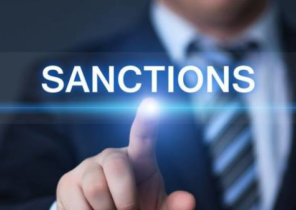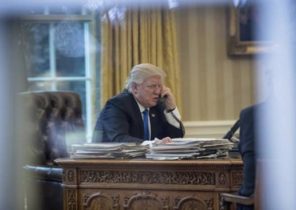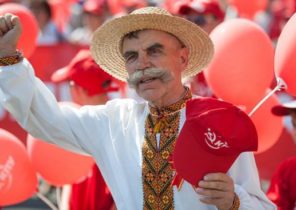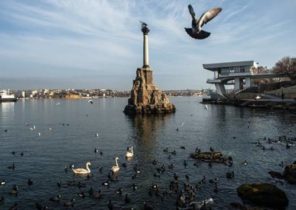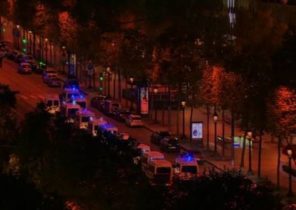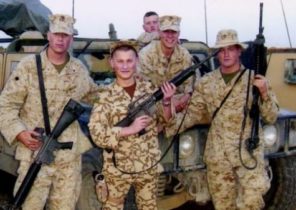
We already have two important forecast for 2017. Bloomberg predicts that the European elite will sign with Moscow an agreement on the division of spheres of influence in Eurasia — Yalta world-2. Agency Stratfor, in turn, portends the resurgence of military and offensive actions of Russia in the global scale and suggests that Vladimir Putin has every chance to take advantage of the chaos in the Eurasian space. Despite the loud statements of the Secretary of the national security Council and defense of Ukraine Oleksandr Turchynov, who said that in 2016 the country does not lose a single meter of our land, and promised that next year will be a turning point for the territory of the antiterrorist operation, opinions from Kiev sound too pessimistic.
The majority of Ukrainian experts predict for the year 2017, the outbreak of open conflict with Russia, however, this does not mean that, in their opinion, it is not planning. The Kremlin just changed the priorities: presidential election in France and parliamentary elections in Germany in the strategic plan are more important than conventional war, which would entail large costs and would re-unite the Western countries. However, it should be emphasized that, according to all forecasts, will continue limited military action with the use of so-called police “people’s republics” (and not regular units of the Russian army) is an effective tool to destabilize the situation in Kiev and a powerful card in negotiations with the West. It is expected that the activity of the “separatists” will rise on Orthodox Christmas.
Much safer and cheaper plan for Moscow in 2017, is a further political and economic destabilization of Ukraine with attraction, how to add Ukrainian experts, agents of influence. Among them mention Rinat Akhmetov and Viktor Medvedchuk, Tymoshenko, Hope Savchenko, Dmitry Yarosh and some less well-known politicians, journalists or representatives of non-governmental organizations that directly or indirectly receive funding from the Pro-Russian interest groups and primarily Pro-Russian oligarchs, still representing, protecting and advancing the interests of the Kremlin in Ukraine. I should add that the Ukrainian Institute for the future believes the most likely is such a scenario, in which one after another will follow: the rapprochement of Putin and trump, complex dialogue about a new division of spheres of influence, increasing pressure on Ukraine to implement the Minsk agreements; a decrease in financial assistance to Kiev from the United States; the partial lifting of sanctions against Russia over the conflict in the Donbass, and then de facto recognition of the annexation of Crimea.
Russia’s actions against Ukraine at the international level:
— To destabilize the internal situation and foreign policy of Lithuania, Latvia, Estonia, Poland, Belarus, Slovakia, Moldova, Czech Republic and Germany in the first place on the Ukrainian direction that aims to disrupt the provision of the Kiev political and economic assistance. Special role to play as historical themes, and the scope of the ambitions of a nation. We should expect provoking the critics of the escalation of the conflict between different political forces, national and community groups against the background of current events or historical discussions. Recently, the Russian side even put forward the thesis that the Belarusian language was invented by her intelligence, and Belarus never was and never will be, like Ukraine, an independent state.
— Economic attack, information campaigns, and economic destabilization in the East. The first point involves the disruption of traditional trade routes linking Ukraine with the CIS countries. The second block favorable decisions or further developing cooperation at the EU level and its individual members, with, in particular, support for far-right and ultra-left forces that oppose the expansion or even the existence of the European Union in its present or any other form.
Attack, discredit, protests, information campaigns and other actions intended to hamper the activities of foreign experts in Ukraine (especially may suffer the representatives of Poland).
— Continuation of information and psychological war against the Western countries with the involvement of the Kremlin propaganda media (especially RT and Sputnik), Pro-Russian politicians, celebrities, moral leaders, journalists, experts, and also anti-European/Pro-Russian organizational and political structures to create a negative image of Ukraine in the world or incite pressure on Kiev, which would be shared Pro-Russian forces to further destabilize the country.
The use of the Ukrainian minorities abroad for political (different kinds of attacks on the Ukrainian Diaspora, its structure and organization), economic (anti-immigrant and xenophobic rhetoric) direction.
— Using the snowball effect and feedback in the Russian propaganda. The spread of the idea that Europe has a negative attitude towards Kiev or not seeking to walk with him to the convergence (the Dutch case) contributes to the promotion in Ukraine the Pro-Russian propaganda discourse, strikes at the Western aspirations of the overwhelming majority of Ukrainian society and legitimizing anti-Ukrainian forces in Europe.
— Intensive financial and expert support to Ukrainian institutions, organizations and media, which are the subject of the Intermarum. The Kremlin is seeking to spread the idea of Intermarium could be an alternative for integration with NATO and the EU, thus returns the thesis of the so-called third way for Ukraine (with the EU, Union with Russia).
Russia’s actions on the domestic level:
— Focusing by using all channels of Russian propaganda political crisis, mistrust of Ukrainian society to the authorities, economic problems, the slow pace or failure of reforms.
— Escalation, lighting and instigating political scandals, especially related to the field of anti-corruption operations and painful for many social groups and political reforms. This activity is aimed at feeding a negative attitude to the authorities, political conflicts, and ultimately to the inhibition of reforms, discrediting experts, politicians, journalists, public figures and representatives of NGOs, and undermine the image of Ukraine and its leadership.
— Using themes of energy diversification and energy sector reforms to create tension and negative attitude to authorities and to the reforms as such (the growth of tariffs for electricity and gas within the framework of implementation of the recommendations of international institutions). Such sentiments will provide a base for activities of populists and Pro-Russian forces, primarily the main successor of the Party of Regions the Opposition bloc.
— Financial and speculative attack (including on the Ukrainian currency), in coordination with the Ukrainian oligarchs or directly with their hands, as well as political and economic provocations (for example, allegations of misappropriation of Russian gas, pay money to Russian companies, espionage, and sabotage activities).
— Destabilization mainly in the border regions (Lviv, Transcarpathian, and in addition, Odessa region). With this purpose, under the slogans of democratization and strengthening of self-government may be established local structures (parties, organizations, associations), which will be in reality a cover for actions aimed at decentralization, federalization, autonomy, pressure on Kiev and deceleration of reforms. At the same time they will become a tool for attacks and information operations (in particular, to create an image of Ukraine as a country torn by internal conflicts, or use the issue of national minorities — Polish, Hungarian, Romanian or Russian).
— Escalation and replenishment of religious conflicts in particular between the Ukrainian Orthodox Church of the Moscow and Kiev Patriarchates, or between the Orthodox and Greek Catholics. As a result, it will contribute to further destabilization of the state and under the guise of fighting for “moral” takes the conflict or tensions in the sphere of values and worldview (which is likely to be used against the politicians at the regional and national level).
— Involvement of paramilitary organizations and representatives of the criminal world (of sports organizations, the mafia, smugglers and Pro-Russian Cossack organizations) to conduct sabotage and creating a sense of chaos and danger. This can be used for the escalation of tensions on a national basis (attacks on members of national minorities or foreign tourists) or dramatizations of such attacks, the Ukrainians from their neighbors, to aggravate, to complicate or make impossible a political dialogue with those or other States. At risk are the poles in Lviv region and the Transcarpathian Hungarians.
— Return to the question of bilingualism of Ukraine, which, apparently, will be combined with the policy of Kiev in relation to the now-occupied Luhansk and Donetsk regions and the Crimea (Amnesty for so-called “people’s militia”, state financial support for the reconstruction of infrastructure or the settlement of any obligations, for example related to the operation of Ukrainian Railways). The goal is the escalation of the internal conflict and further polarization of Ukrainian society around one of the main propaganda themes of the Kremlin (to protect the Russian and Russian-speaking minorities outside of Russia) who is going to use it in its foreign policy and in the political arena. This policy is, apparently, involve famous or controversial figures, including ousted from the party Timoshenko Nadiya Savchenko, who created his party and has already met with accusations of working for the Russians.
— Creating tension in the ideological direction. We should expect activation of the new right-wing forces, who will be encouraged to expel the traitors from the government/state, to make a new revolution, to give the regions broad autonomy, establish cooperation with foreign radical forces, to abandon integration with the EU and NATO, and to restore the nuclear potential of Ukraine.
— Hacker attacks on Ukrainian military and critical infrastructure, designed to paralyze the government, to create a sense of threat and to prepare the ground for regime change, riots or provocative attempts to paralyze the state, “revolutionary” way (who will stand by the Ukrainian non-governmental or Patriotic organization).
— The escalation of the military conflict is theoretically possible, however, to date, it appears that it will be involved solely military structures DND and LNR. One of the main signals on the preparations for the new phase of the conflict will attempt to restore the airports in Donetsk or Lugansk, or to create a runway elsewhere. However, to put this plan into action so that Western observers and the Ukrainian troops did not notice anything, it will be difficult.
— Further operations in information and psychological war, which Russian media are against Ukrainian companies, experts, journalists, scientists, military and certain groups of the population, primarily Russian-speaking. Russian actions are aimed at undermining the credibility of the Ukrainian media, politicians and experts. You can expect new and extra coordination of existing media, which will deal with the legitimization of the Pro-Russian information and active disinformation and political provocations. This can be, for example, reports of attacks of the Ukrainian army on civilians, the danger of fascism, inflated prices of European gas, the indifference of the West to Ukraine, the government of betrayal of the interests of the people, the impending collapse of the state, attacks Poland, Hungary or Romania (including agreed upon) on Ukrainian territory or on the critical situation of the Ukrainian/Russian in Ukraine/ Donbass/ at the front/ in the neighboring countries.
The results
Western experts seem to mostly ignore the fact that the Russian plans (including military operations) are thought over for many years to come. The scenario of annexation of Crimea and hostilities in the Donbass was created long before the Revolution of dignity, and the dismantling of the Ukrainian defence structures and the process of penetration by the Russian secret services took many years. Thus a long-term strategy of the Kremlin in some way took into account the current situation and the reaction to it of the West. Strategic planning for decades ahead helps the Russian authoritarian system to function, and also allows to effectively coordinate the actions of the Russian special services, which can not achieve the Western democratic countries. Large-scale analytical facilities provides the ability to quickly respond to events and adjust short-term action.
In this regard, the Ukrainian analysts expressed almost with one voice, saying that Russia does not fear Western sanctions, have taken a wait. In the long run this strategy will cost less than war, but at the same time will allow the Russians to keep their territorial gains, to block Ukraine’s integration with Western institutions and have a direct impact on the political scene neighbor. They will be able to engage in dialogue with the world of politics and business at the global level, but simultaneously to prepare a framework for action in the new circumstances, which will bring intense for the United States and Europe. At the end of spring the final decision on the Syrian issue, which will allow Russia to deploy more forces on the Ukrainian front. The only factor that can make a difference is event on the Moscow — Beijing — Washington and the beginning of a new phase of rivalry between them, which will force the Kremlin to refocus attention, for example, the North pole or the Pacific ocean.
Russia needs Ukraine for geopolitical reasons. Although most experts did not foresee the outbreak now in Ukraine an open war, Moscow’s objective remains the same. Russian experts on propaganda successfully used the weak point of the West that Europeans are “tired” of the Ukrainian theme.
The future will largely depend on the actions of the allies: the United States and Germany. While nothing portends proximity of the tragedy, however, the majority of Ukrainian experts (both theoreticians and practitioners) believe that the outbreak of full-scale war is only a matter of time. If the Russians decide that they can’t stop the Ukrainians in their movement to the West will likely be decided on the maximum possible destruction or capture of the human, intellectual, technological and natural resources of Ukraine. Ukrainians believe that if the convergence scenario of Putin and trump will become a reality, the Kremlin can take advantage of this situation to “raise the stakes” and lead to escalation of the conflict or try to grab the new trophies on Ukrainian soil.
